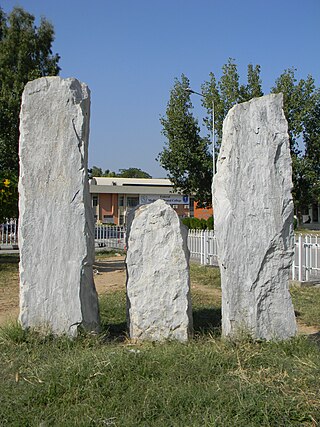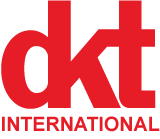
Mifepristone, also known by its developmental code name RU-486, is a medication typically used in combination with misoprostol to bring about a medical abortion during pregnancy and manage early miscarriage. This combination is 97% effective during the first 63 days of pregnancy. It is also effective in the second trimester of pregnancy. It is taken by mouth.

Family planning is the consideration of the number of children a person wishes to have, including the choice to have no children, and the age at which they wish to have them. Things that may play a role on family planning decisions include marital situation, career or work considerations, financial situations. If sexually active, family planning may involve the use of contraception and other techniques to control the timing of reproduction.
The Mexico City policy, sometimes referred to by its critics as the global gag rule, is a former United States government policy that blocked U.S. federal funding for non-governmental organizations (NGOs) that provided abortion counseling or referrals, advocated to decriminalize abortion, or expanded abortion services. When in effect, the Mexico City policy is a U.S. government policy that requires foreign non-governmental organizations to certify that they will not "perform or actively promote abortion as a method of family planning" with non-U.S. funds as a condition for receiving U.S. global family planning assistance, and during its January 23, 2017 implementation any other U.S. global health assistance, including U.S. global HIV and maternal and child health (MCH) assistance.
The Planned Parenthood Federation of America, Inc. (PPFA), or simply Planned Parenthood, is an American nonprofit organization that provides reproductive and sexual healthcare and sexual education in the United States and globally. It is a member of the International Planned Parenthood Federation (IPPF).
Reproductive rights are legal rights and freedoms relating to reproduction and reproductive health that vary amongst countries around the world. The World Health Organization defines reproductive rights as follows:
Reproductive rights rest on the recognition of the basic right of all couples and individuals to decide freely and responsibly the number, spacing and timing of their children and to have the information and means to do so, and the right to attain the highest standard of sexual and reproductive health. They also include the right of all to make decisions concerning reproduction free of discrimination, coercion and violence.

An unsafe abortion is the termination of a pregnancy by people lacking the necessary skills, or in an environment lacking minimal medical standards, or both. An unsafe abortion is a life-threatening procedure. It includes self-induced abortions, abortions in unhygienic conditions, and abortions performed by a medical practitioner who does not provide appropriate post-abortion attention. About 25 million unsafe abortions occur a year, of which most occur in the developing world.

Sexual and reproductive health (SRH) is a field of research, health care, and social activism that explores the health of an individual's reproductive system and sexual well-being during all stages of their life. Sexual and reproductive health is more commonly defined as sexual and reproductive health and rights, to encompass individual agency to make choices about their sexual and reproductive lives.

Phil Harvey was an American entrepreneur, philanthropist and libertarian who set up large-scale programs that delivered subsidized contraceptives in poor countries. Harvey was the founder and former president of DKT International, the Washington, D.C.-based charity that implements family planning and HIV/AIDS prevention programs in 57 countries across Africa, Asia and Latin America. He was the chief sponsor of the DKT Liberty Project which raised awareness about freedom of speech issues in the U.S. Harvey was also the president of Adam & Eve, the North Carolina–based company that sells sex toys, adult films and condoms. Consequently, he has been called "one of the most influential figures in the American sex industry today".
MSI Reproductive Choices, named Marie Stopes International until November 2020, is an international non-governmental organisation providing contraception and safe abortion services in 37 countries around the world. MSI Reproductive Choices as an organisation lobbies in favour of access to abortion, and provides a variety of sexual and reproductive healthcare services including advice, vasectomies, and abortions in the UK and other countries where it is legal to do so. It is based in London and is a registered charity under English law.
Abortion in the Philippines is constitutionally prohibited. The constitutional provision that "[The State] shall equally protect the life of the mother and the life of the unborn from conception" was crafted by the Constitutional Commission which drafted the charter with the intention of providing for constitutional protection of the abortion ban, although the enactment of a more definitive provision sanctioning the ban was not successful. The provision is enumerated among several state policies, which are generally regarded in law as unenforceable in the absence of implementing legislation. The 1987 Constitution also contains several other provisions enumerating various state policies. Whether these provisions may, by themselves, be the source of enforceable rights without implementing legislation has been the subject of considerable debate in the legal sphere and within the Supreme Court.

Adam & Eve is an American independent company that sells adult products through e-commerce. In 2004, it was the largest mail order distributor of sex toys, condoms, and erotica in the United States. Its parent company, PHE Inc., is the largest private employer in Hillsborough, North Carolina, where its headquarters are located. The company funds non-profit social marketing organizations that address issues such as population growth, disease control, and sex education in developing countries.

Birth control, also known as contraception, anticonception, and fertility control, is the use of methods or devices to prevent unintended pregnancy. Birth control has been used since ancient times, but effective and safe methods of birth control only became available in the 20th century. Planning, making available, and using human birth control is called family planning. Some cultures limit or discourage access to birth control because they consider it to be morally, religiously, or politically undesirable.

Even though there is considerable demand for family planning in Pakistan, the adoption of family planning has been hampered by government neglect, lack of services and misconceptions. Demographics play a large role in Pakistan's development and security since the change from military rule to civilian leadership. Challenges to Pakistani's well-being, opportunities for education and employment, and access to health care are escalated due to the country's continuously-growing population. It was estimated in 2005 that Pakistan's population totaled 151 million; a number which grows 1.9 percent annually, equaling a 2.9 million population growth per year. Though Pakistan's fertility rates still exceed those of neighboring South Asian countries with a total fertility rate at 4.1 and contraception use is lower than 35 percent, approximately one-fourth of Pakistani women wish to either delay the birth of their next child or end childbearing altogether.

Birth control in the United States is available in many forms. Some of the forms available at drugstores and some retail stores are male condoms, female condoms, sponges, spermicides, over-the-counter progestin-only contraceptive pills, and over-the-counter emergency contraception. Forms available at pharmacies with a doctor's prescription or at doctor's offices are oral contraceptive pills, patches, vaginal rings, diaphragms, shots/injections, cervical caps, implantable rods, and intrauterine devices (IUDs). Sterilization procedures, including tubal ligations and vasectomies, are also performed.
A medical abortion, also known as medication abortion or non-surgical abortion, occurs when drugs (medication) are used to bring about an abortion. Medical abortions are an alternative to surgical abortions such as vacuum aspiration or dilation and curettage. Medical abortions are more common than surgical abortions in most places around the world.

Carafem is an American nonprofit organization that provides women’s reproductive health services with centers in Maryland, Atlanta Georgia, Chicago Illinois, and Nashville TN metro areas as well as virtual care in select states. The organization seeks to normalize, "de-medicalize" and remove the social stigma from the provision of birth control and early abortions amidst an ongoing polarized and politicized debate on abortion in the United States. The organization intentionally uses certain language, such as "health center" instead of "clinic", and openly uses the word "abortion" in its advertising.

Abortion in Kenya is prohibited with the exception of certain circumstances including danger to the life and health of the expectant mother, and rape. Unsafe abortions are a major cause of deaths and health complications for women in Kenya.
In Madagascar, abortion is illegal in all circumstances. The abortion law punishes receiving or assisting in an abortion with imprisonment or fines. It is one of the only countries with a total abortion ban. Abortion has been illegal since the French colonial era, influenced by attitudes favoring increased births. In 2017, the government rejected a proposal to legalize therapeutic abortion. A bill allowing abortion in the case of rape was proposed by Member of Parliament Masy Goulamaly in November 2021 but was withdrawn by the parliament.

In Africa, abortion is subject to various national abortion laws. Most women in Africa live in countries with restrictive laws. Most countries in Africa are parties to the African Union's Maputo Protocol, the only international treaty that defines a right to abortion. Sub-Saharan Africa is the world region with the highest rates of unsafe abortions and abortion mortality. Most abortions in the region are unsafe. The region has the highest rate of unintended pregnancy, the primary motive for abortion. The most likely women to have abortions are young, unmarried, or urban. Post-abortion care is widely available.
In Guinea, abortion is illegal unless the pregnancy poses a threat to the life or health of the pregnant woman or fetus, if it resulted from rape, or if the pregnant woman is a minor. Illegal abortions are punishable by fines and prison. Legal abortions require approval from doctors in the case of therapeutic abortion or ethics committees in the case of abortion from rape. The conditions for legal abortion are debated. Women's rights activists and journalists have advocated for reform.












